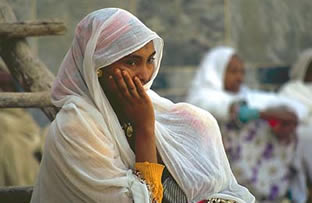 This is the traditional Ethiopian garb. It is made of cheesecloth woven by hand with cotton thread spun on a spindle.
This is the traditional Ethiopian garb. It is made of cheesecloth woven by hand with cotton thread spun on a spindle.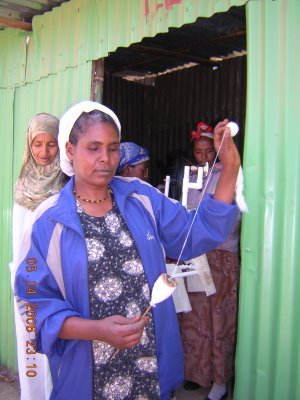
Here is an Ethiopian woman spinning cotton fiber on a spindle. It is nothing more than a barbecue stick, a whorl made of heavy cardboard and a staple wire bent for parking the just-spun thread.
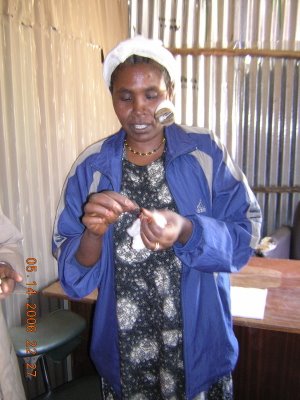
And when she needs to park the spindle to fluff her fiber, she does so on her ear. A charming process. That is, until you think about the realities of life in Africa: Needing to spin to survive.
In the last five years, I have had the privilege of traveling to Africa on the business of battling AIDS. I have met grassroots folks who have had to support community AIDS projects with income-generating activities, such as selling their own handicrafts.
As an aspiring spinner then, I had also struggled to produce spun yarn, with a spindle, that was long enough to make a knitted swatch. In time, I just bit the bullet and bought my first spinning wheel. And, boy, did it gallop, compared to the spindle!
Then I produced my first full bobbin and niddy-noddied it to a skein. Then there were 50 skeins consecrated to the Brooklyn Renegade Craft Fair booth of Handspun Collective, a consortium of "spinners with attitude" that I belong to. Then Jacey Boggs, Insubordiknit herself, emailed an invite, "Can you produce 300 skeins for Stitches East between May and October?!" Hmm, that is a lot, but with a wheel, it's do-able.
So, I knew that if I could only get spinning wheels to an African country with a strong handspinning tradition, it could make a difference. Or, at least, I could try.
My first stop was New Zealand, land of wool and second home to me and my husband. I knocked at the doors of Ashford and Majacraft. Ashford offered a substantial discount on their spinning wheels and no break on shipping. Majacraft offered two old spinning wheels -- not their brand -- that had gathered dust in its factory shed that was going to be abandoned for a new one. Glynis Poad, the owner and the spinning lady in all the Majacraft ads, also volunteered to pick up the shipping tab. I took up her kind offer.
Once the vintage wheels arrived at my doorstep in Maryland, I realized that bringing them to Africa was not the way to go. First, even in their dismantled state, they were bulky, not to mention, heavy. They would be expensive to dispatch, whether as parcel or as checked-in luggage. Second, they were not simple enough to duplicate, if the end-users so desired. Third, the standard spinning wheels are more for wool than cotton, which is the fiber of choice in the continent, although they raise sheep for wool in some parts of Africa. So, I sold the wheels to aspiring spinners at my fiber workshop, the Springwater in Alexandria, Virginia. I turned around and registered myself with Nels Wiberg's Babe's Garden Fiber as a retailer of PVC pipe charkhas, the ideal equipment for spinning cotton. Weighing 2 lbs., 11 oz., getting them to their destination would be no trouble at all.
And that is how I was able to bring four charkhas to Addis Ababa this month.
"PVC?" the Mary Joy project manager of the kebele (locality) I went to said, "sure, we have those; we use them as water pipes."
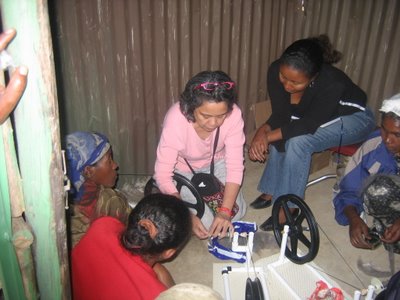 Here I am assembling a charkha with a Mary Joy staffer who acted as interpreter.
Here I am assembling a charkha with a Mary Joy staffer who acted as interpreter.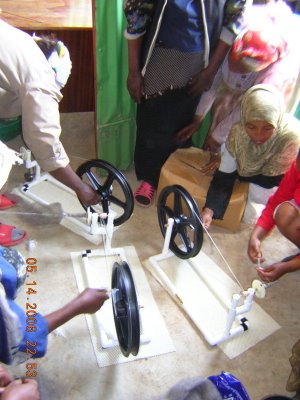 As anybody anywhere in the world with a new "toy", the Ethiopian women were enthralled.
As anybody anywhere in the world with a new "toy", the Ethiopian women were enthralled. In the meantime, I have met other Africans who would like to see the same equipment introduced to other countries in the continent. Togo, for instance. And Mali, where they are, I was told, also badly in need of handcarders.
In the meantime, I have met other Africans who would like to see the same equipment introduced to other countries in the continent. Togo, for instance. And Mali, where they are, I was told, also badly in need of handcarders.If you would like to help by donating an idle spinning wheel or a set of handcarders, please email me.
Alternatively, a cigar box charkha can be built with Spin-Off magazine instructions at this site. Also, I'd be happy to receive spare dog rakes and combs as handcarder substitute. Email me for the address. Thank you, Ava and Cheri, for the great ideas.